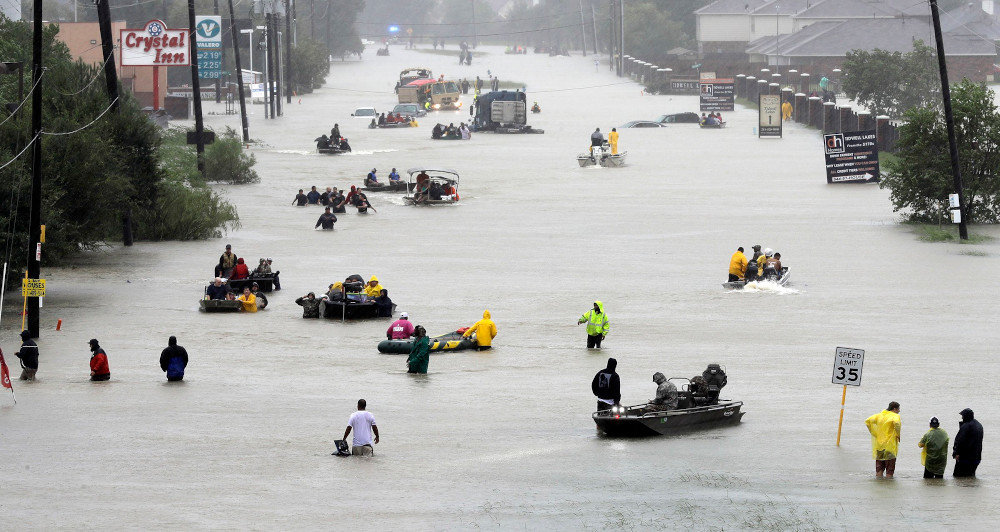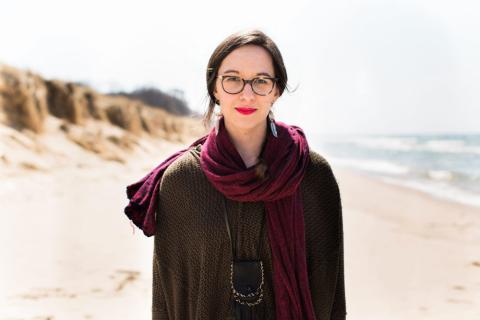
Rescue boats fill a flooded street as flood victims are evacuated as floodwaters from Tropical Storm Harvey rise on Aug. 28, 2017, in Houston. (AP/David J. Phillip)
Recently my partner and I were doing a scavenger hunt with our two kids through the neighborhood as we practiced social distancing. The kids were looking for the last item on their checklist, a rainbow — a sign, a bumper sticker, anything that resembled one, and we were having a hard time.
As we continued walking, my partner brought up the Hebrew biblical story of the rainbow, how we see it as a promise that God would never flood the earth again. Then we talked about the irony of this, because, while we aren’t in the midst of a worldwide flood, we are facing a worldwide pandemic, and it feels pretty bleak. It feels like we’re all searching for a rainbow, a sign that we have not been abandoned.
Like the flood that came and wiped away everything and everyone, a pandemic is sweeping across all households and street corners, stealing life and breath from so many. We grieve now, maybe the way that Noah grieved then, or, in the Potawatomi flood story, the way that Original Man may have grieved after the world was destroyed, drowned by water. Surely, we need to trust that Creator, God, Yahweh knows what they are doing — but any loss of life is grief-worthy, isn’t it?
I arranged my new book, Native: Identity, Belonging and Rediscovering God, around that Potawatomi flood story, an important story in our culture about a time when the earth was destroyed and all the creatures were asking what life would look like on the other side of re-creation.
The scene goes something like this: Original Man is sitting on a fallen tree, floating on what seems to be a bottomless ocean, wondering if earth can be re-created again, his creature kin at his side wondering the same thing.
Right now, we are Original Man. We are surveying a devastated world, and we are asking what life will look like on the other side of this pandemic. Who will we be after we’ve grieved what once was? Who are we in the face of real scarcity?
The opening line of my book says, “Indigenous bodies are bodies that remember.” As Indigenous peoples, we are remembering our ancestors have struggled through pandemics before. We have faced annihilation, and we have survived. We are asking what it means to be Indigenous in this time, what it means to grieve and to lean into our resilience as well.
If you follow any therapists, spiritual advisers, social workers or mental health care workers online, you’ll see posts about taking time to grieve, about self-care, about acknowledging that this is hard, that this isn’t a vacation but a crisis. And I would say we are dealing with many crises within a larger crisis — we had lives before this pandemic struck, each of us is dealing with personal grief, loss and difficulties, and we are also faced with the weight of collectively grieving this.
In the Potawatomi story, the animals finally decided to do something about their predicament. I imagine that they looked at each other, and one of them whispered, “It’s time” and they knew. They took turns diving down into the water to try to bring up some dirt so that they could figure out how to have land again. Animal after animal failed, until finally the muskrat volunteered. Muskrat dove deep down, finally coming up with fistfuls of dirt. But he died along the way, sacrificing his life to save his kin, to help them begin again.
First the grieving, then the doing, then a new beginning.

Kaitlin Curtice, Native American author, speaker and worship leader. (AP/RNS/Amy Paulson Photography)
Right now, we grieve. People all across the world are losing loved ones, and our political and economic systems are fighting to see if they are strong enough to hold up against a pandemic. America, founded on the oppression of Indigenous and Black peoples, upheld by capitalism, is reeling, and we don’t know exactly how big the fallout will be.
Disabled and immunocompromised peoples have been silenced, their experiences ignored even as the world tries to figure out how to practice social distancing and care for the most vulnerable among us. Disabilities activists asked us to stay inside long before we decided to — even after many people continued to swarm to beaches and shopping malls, risking the lives of so many in the process. As abled people, we should be paying attention, understanding that solidarity means making sure we act in the best interest of all of us.
Indigenous, Black and Brown communities are experiencing deep inequity in outcomes in the face of this pandemic. There is so much to grieve, and there is so much being revealed as we fight to stay alive.
And yet, we are also anxious to know what a post-pandemic world is going to be like. What will our systems look like? How will our economies survive? Will our leaders learn anything, or must the people continue to cry out for justice?
After the muskrat came back up to the surface of the water, he took the clumps of dirt from his paws and placed them on the turtle’s back so that land could begin to grow again, creatures could return to the earth and people could live in better ways than they had before.
First the grieving, then the doing, then a new beginning.
We don’t know what life will look like in the coming months. But we can learn from the stories we’ve told throughout generations, stories like the ones told in the Hebrew Bible, stories like the ones told by Anishinaabe peoples, by Indigenous peoples across the world.
Being human means we belong to one another, and we belong in relationship to this earth.
In the introduction of Native, I begin with a charge to the reader:
May we walk into tomorrow together, side by side, with a deep and sacred knowledge burning in our bones. This is the gift of our humanity, the unfiltered essence of sacredness that we belong to and that belongs to us.
May we grieve together, and, when we are ready, help create a better world on the other side of this.
Somewhere, there’s a bumper sticker rainbow waiting to be found.
(Kaitlin B. Curtice is a citizen of the Potawatomi Nation as well as a Christian, public speaker and poet. She travels around the country speaking on faith and justice within the church as it relates to Indigenous peoples. She is the author of "Glory Happening: Finding the Divine in Everyday Places" and writes on her blog at www.kaitlincurtice.com. The views expressed in this commentary do not necessarily reflect those of Religion News Service.)
Advertisement




